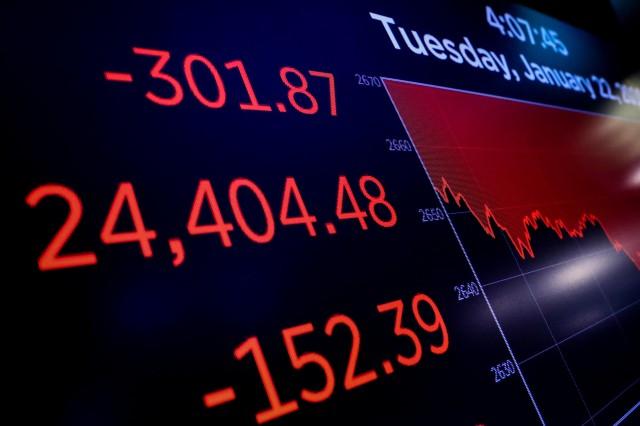Wall Street drops as economic outlook, corporate forecasts sour

NEW YORK - US stocks ended lower on Tuesday, snapping a four-session rally, as a gloomy global economic growth outlook, trade concerns and disappointing company forecasts dampened sentiment.
All three major US stock indexes pared losses after White House economic advisor Larry Kudlow denied a report by the Financial Times that the Trump administration canceled preparatory trade talks with China.
Still, the S&P 500, the Nasdaq and the Dow all posted their biggest one-day percentage drops since Jan. 3.
On Monday, the International Monetary Fund trimmed its 2019 global economic growth estimates, and China confirmed its slowest economic growth rate in 28 years.
"There seems to be a plethora of negative news regarding the global economy and China and the corporate profits that were reported today couldn't offset that," said Chuck Carlson, chief executive officer at Horizon Investment Services in Hammond, Indiana.
"A lot of companies are coming out with earnings this week, so it's going to be a battle between earnings and the perception of what's going on China and the global market," Carlson added.
The downbeat China news pulled chipmakers lower. The Philadelphia SE Semiconductor index fell 2.9 percent.
Each of the FAANG momentum stocks, Facebook Inc, Apple Inc, Amazon.com, Netflix Inc and Google parent Alphabet Inc, ended down between 1.6 percent and 4.1 percent.
Fears of a slowdown in corporate profits mounted as companies posting fourth-quarter results provided disappointing forward-looking projections.
Johnson & Johnson dropped 1.4 percent after its 2019 sales forecast fell short of analyst expectations.
Shares of Stanley Black & Decker Inc tumbled 15.5 percent after its disappointing 2019 forecast.
The Dow Jones Industrial Average fell 301.87 points, or 1.22 percent, to 24,404.48. The S&P 500 lost 37.81 points, or 1.42 percent, to 2,632.9 and the Nasdaq Composite dropped 136.87 points, or 1.91 percent, to 7,020.36.
Of the 11 major sectors of the S&P 500, all but utilities closed lower. Industrials, energy, communications services and consumer discretionary had the largest percentage losses.
With just over 12 percent of S&P 500 companies having reported thus far, 78.7 percent have beat expectations. Analysts expect S&P 500 fourth-quarter earnings growth of 14.1 percent, down from 20.1 percent on Oct. 1, according to Refinitiv data.
Oilfield services company Halliburton Co declined 3.1 percent as falling oil prices and slowing US demand weighed on fourth-quarter results.
International Business Machines Corp rose in post-market trading after reporting a smaller-than-expected drop in fourth-quarter revenue.
During the dearth of US economic data stemming from the government shutdown, a report from the National Association of Realtors showed US sales of existing homes fell in December to the lowest level in three years.
The PHLX Housing index fell 1.8 percent.
Declining issues outnumbered advancing ones on the NYSE by a 3.16-to-1 ratio; on Nasdaq, a 3.15-to-1 ratio favored decliners.
The S&P 500 posted 3 new 52-week highs and 1 new low; the Nasdaq Composite recorded 19 new highs and 33 new lows.
Volume on US exchanges was 7.97 billion shares, compared to the 8.24 billion average over the last 20 trading days. — Reuters




